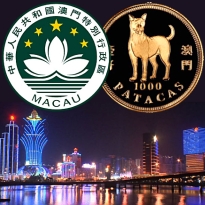 The government in China’s Special Administrative Region (SAR) of Macau expects tax revenue from gaming to total 92b patacas (US $11.5b) this year. Francis Tam Pak Yuen, Macau’s secretary for Economy and Finance, told the Legislative Assembly that the SAR’s 35% tax on gross gaming revenues has collected MOP 76.3b in the first 10 months of 2011, a year-on-year increase of 46.6%. The 2010 total of MOP 65b represented 81.6% of the SAR’s total tax revenues.
The government in China’s Special Administrative Region (SAR) of Macau expects tax revenue from gaming to total 92b patacas (US $11.5b) this year. Francis Tam Pak Yuen, Macau’s secretary for Economy and Finance, told the Legislative Assembly that the SAR’s 35% tax on gross gaming revenues has collected MOP 76.3b in the first 10 months of 2011, a year-on-year increase of 46.6%. The 2010 total of MOP 65b represented 81.6% of the SAR’s total tax revenues.
Casino operators in Macau are hoping the government uses some of that tax revenue to improve transportation infrastructure. Sands China president Edward Tracy told the Macau Daily Times that the local gaming industry was too dependent on visitors from Guangdong province, and that the industry needed to “reach beyond our comfort zones and to other countries in Asia.” Tracy sees the future Guangzhou-Zhuhai railway, which will connect Macau’s Light Rapid Transit system to Hengqin Island, as a good start. But with India’s huge population base just five hours away by air, Tracy hopes the SAR’s airport will offer greater incentives for air travel firms — like India’s Kingfisher Arlines — to add direct flights to Macau.
Of those already coming to Macau, the number of visitors from mainland China totaled 11.7m in the first nine months of 2011, a rise of 19.8% over 2010. Asked by University of Macau researchers to rate their experience of Macau’s casinos, visitors gave the gaming joints a 4.3 out of 5. That was significantly above the rating afforded to Macau’s other amenities, with hotels scoring 3.7 and the aforementioned transportation a woeful 3.1. Overall, tourists gave Macau a 3.4 out of five, suggesting the region still has a way to go before it can claim ‘world class destination’ status.
World class destination might be an understatement if plans for a proposed Macau Pro Am Open in 2013 come to fruition. Gaming Today quoted an American businessman named William Murray as saying he was working with five Chinese industrialists to create a poker tournament that would ultimately dwarf the World Series of Poker, at least, in terms of the pay packets. Murray claims the goal would be to create a prize pool of US $65-100m, with a main event first prize of $25m (three times the prize earned by WSOP 2011 winner Pius Heinz). Murray hopes to attract 500 (presumably deep pocketed) participants from Asia, the US and elsewhere. If Murray’s dreams come true, it would “establish Macau as the poker tournament capital of the world … Macau is already the baccarat capital of the world and now we are completing the other half of the puzzle, poker.”